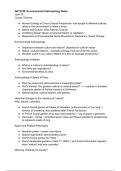Class notes
Environmental Anthropology Course notes
- Course
- ANT3106 (ANT3106)
- Institution
- University Of Ottawa (U Of O )
These notes from ANT3106: Environmental Anthropology explore the intricate relationships between human societies and their environments, focusing on how cultural practices and beliefs shape, and are shaped by, ecological systems. Key topics include Human and Cultural Ecology, the nature-culture div...
[Show more]



